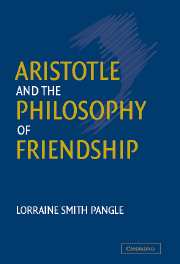Book contents
- Frontmatter
- Contents
- Acknowledgments
- Introduction
- 1 The Challenge of Plato's Lysis
- 2 The Three Kinds of Friendship
- 3 Aristotle and Montaigne on Friendship as the Greatest Good
- 4 Friendships in Politics and the Family
- 5 Cicero's Laelius: Political Friendship at Its Best
- 6 Quarrels, Conflicting Claims, and Dissolutions
- 7 Friends as Other Selves
- 8 Goodwill, Concord, and the Love of Benefactors
- 9 Self-Love and Noble Sacrifice
- 10 Friendship in the Happy Life
- Notes
- Bibliography of Modern Works and Editions
- Index of Names
1 - The Challenge of Plato's Lysis
Published online by Cambridge University Press: 04 July 2009
- Frontmatter
- Contents
- Acknowledgments
- Introduction
- 1 The Challenge of Plato's Lysis
- 2 The Three Kinds of Friendship
- 3 Aristotle and Montaigne on Friendship as the Greatest Good
- 4 Friendships in Politics and the Family
- 5 Cicero's Laelius: Political Friendship at Its Best
- 6 Quarrels, Conflicting Claims, and Dissolutions
- 7 Friends as Other Selves
- 8 Goodwill, Concord, and the Love of Benefactors
- 9 Self-Love and Noble Sacrifice
- 10 Friendship in the Happy Life
- Notes
- Bibliography of Modern Works and Editions
- Index of Names
Summary
In the Lysis, Socrates' dialogue with two young friends about friendship, Socrates pursues the unsettling idea that all friendship is rooted in human neediness and defectiveness and is treasured only because and only to the extent that we hope to get from others things that we are unable to provide for ourselves. “He who is good … be[ing] to that extent sufficient for himself … would be in want of nothing,” Socrates argues, and hence would neither treasure nor love anything or anyone else. The radical claim advanced in the central section of the dialogue is not merely that human love begins in need – this alone would be a rather unremarkable claim about human development – but that love begins and ends and is wholly driven by need. Moreover, the Lysis explores the possibility that the most important needs that cause us to love are not needs for the pleasures and activities of friendship as such, but are directed to other things that act as remedies for our defects in the way that medicine does for the defects of the body, and to which the human beings we call our friends are merely the means.
- Type
- Chapter
- Information
- Aristotle and the Philosophy of Friendship , pp. 20 - 36Publisher: Cambridge University PressPrint publication year: 2002



